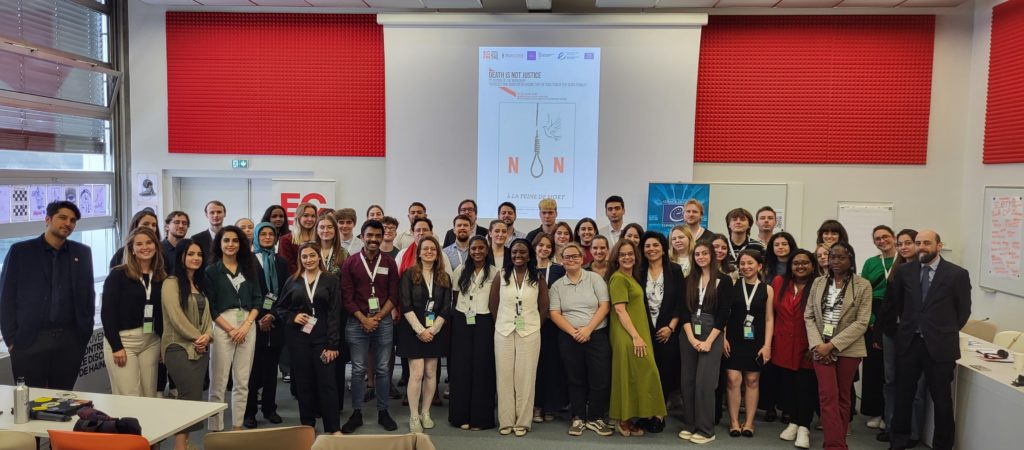
Bien que l’Europe ait accompli des progrès considérables vers l’abolition de la peine de mort, les récents appels à son rétablissement, motivés par la peur et l’instabilité politique, menacent de réduire à néant des décennies de progrès durement acquis. Les mouvements en faveur de la peine de mort remettent en cause les principes fondamentaux des droits humains ainsi que les engagements juridiques internationaux et régionaux ratifiés par la plupart des pays européens. Il est de notre responsabilité de résister à ces discours néfastes et d’œuvrer pour qu’aucun gouvernement n’ait le pouvoir d’ôter une vie. Malgré l’orientation positive de l’Europe concernant l’abolition de la peine de mort, la Biélorussie persiste à utiliser la peine de mort comme forme de punition et a introduit un nouveau délit passible de la peine de mort en 2023 (2). C’est pourquoi nous pensons qu’il faut plaider à la fois pour les pays favorables au maintien de la peine de mort en Europe et au-delà, ainsi que pour les abolitionnistes de fait et de droit, afin que l’abolition universelle de la peine de mort devienne une réalité définitive.
L’un des arguments les plus fréquemment cités en faveur de la peine de mort est son prétendu effet dissuasif sur la criminalité. Toutefois, cette théorie n’est pas étayée par des données empiriques, car les recherches scientifiques actuelles ne fournissent pas de preuves crédibles que la peine de mort a un effet dissuasif sur la criminalité. En fait, les pays qui ont aboli la peine de mort font souvent état de taux de criminalité moins élevé par la suite. Par exemple, le Canada a enregistré une baisse de 44 % du nombre de meurtres après l’abolition de la peine de mort. Au lieu de diminuer la violence, la peine capitale perpétue les cycles de violence. C’est pourquoi le thème de la Journée européenne et mondiale contre la peine de mort de cette année, « La peine de mort ne protège personne », est plus important que jamais.
Nous souhaitons également souligner les violations du droit international commises par de nombreux pays qui imposent la peine de mort et procèdent à des exécutions sur la base de motifs juridiques interdits, en particulier en ce qui concerne les populations vulnérables telles que les mineurs et les personnes handicapées (3). Les États rétentionnistes doivent au moins s’aligner sur le droit et les normes internationales tout en progressant vers l’abolition universelle de la peine de mort.
En tant que réseau diversifié de défenseur·ses de la jeunesse, nous partageons des valeurs et des principes communs. Tout en représentant des nationalités, des âges, des cultures, des croyances et des expériences différents, nous restons uni·es pour créer un avenir où la justice est ancrée dans l’équité, la dignité et le respect de la vie humaine. Ensemble, nous avons évalué de manière critique, par le dialogue, les implications sociales, juridiques et morales complexes qui découlent de l’application de la peine capitale. Nous ne voulons pas que les gouvernements exécutent des individus au nom du peuple. Nous ne voulons pas que des vies soient prises en notre nom. Nous sommes pour l’abolition universelle de la peine de mort partout dans le monde.
(1) Amnesty International, Rapport mondial, Peine de mort et exécutions, 2023, p.9
(2) Amnesty International, Rapport mondial, Peine de mort et exécutions, 2023, p.32
(3) Amnesty International, Rapport mondial, Peine de mort et exécutions, 2023, p. 10
En rédigeant cette déclaration, nous voulons :
● Sensibiliser : nous cherchons à informer et à mobiliser le public et les responsables politiques sur la réalité de la peine de mort.
● Promouvoir les droits humains : l’abolition de la peine de mort est au cœur de la protection des droits humains fondamentaux. Elle est liée à la prévention de la torture, au droit à la vie et à la nécessité de disposer de systèmes judiciaires exempts de discrimination et d’erreur.
● Parvenir à une abolition permanente et universelle : nous nous engageons à œuvrer en faveur de l’abolition permanente de la peine de mort dans tous les pays, en veillant à ce que cette pratique inhumaine devienne une relique du passé.
● Lutter contre les idées fausses et les préjugés : nous visons à remettre en cause et à démystifier les mythes concernant l’efficacité de la peine de mort, en particulier son effet dissuasif supposé, en soulignant le rôle de la recherche et des preuves qui montrent qu’elle ne prévient pas la criminalité.
Nous appelons les gouvernements, la société civile et les institutions internationales à :
● Plaider en faveur de l’abolition universelle de la peine de mort ;
● Communiquer sur le nombre de condamnations à mort et d’exécutions dans le monde afin d’informer sur les réalités de ses pratiques à travers les États et les territoires ;
● Appeler à l’action les organisations partenaires et la société civile pour soutenir l’abolition universelle de la peine de mort ;
● Établir des partenariats avec les jeunes de manière significative afin de les sensibiliser et de lutter contre la résurgence des récits favorables à la peine de mort ;
● Renforcer les mouvements abolitionnistes dirigés par des jeunes ou non ;
● Soutenir les programmes d’éducation et de formation qui mettent en évidence le caractère inhumain de la peine de mort ;
● Promouvoir les pratiques de justice réparatrice qui mettent l’accent sur la guérison, la responsabilisation, la réhabilitation et le traitement des causes profondes de la criminalité, plutôt que sur le châtiment ;
Nous exhortons les États non abolitionnistes à :
● Cesser de condamner des personnes à la peine de mort et cesser les exécutions ;
● S’engager à faire preuve de transparence dans les systèmes judiciaires, notamment en publiant des données précises sur les statistiques relatives aux couloirs de la mort et aux exécutions, et à prévenir les abus de pouvoir ;
● Progresser vers l’abolition de la peine de mort ;
● Ratifier les instruments juridiques internationaux et régionaux interdisant le recours à la peine de mort ;
● Réaffirmer le soutien à la progression de l’abolition de la peine de mort en votant en faveur de la résolution moratoire des Nations unies ;
● Appeler les autres États et territoires à abolir la peine de mort.
En cette Journée européenne et mondiale pour l’abolition de la peine de mort, nous sommes unis dans notre conviction que la jeunesse d’aujourd’hui peut façonner et façonnera un avenir sans peine de mort. Ensemble, nous pouvons construire un monde où la justice n’est pas définie par la vengeance, mais par un système judiciaire équitable protégeant la dignité de toute vie humaine.

l’Office franco-allemand pour la Jeunesse (OFAJ)
